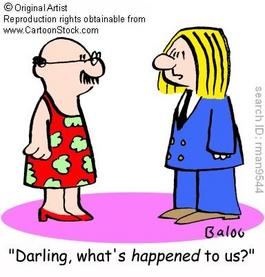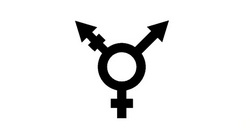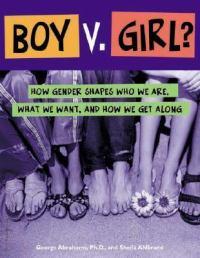Gender Roles

Biologically, women and men are almost identical, so why do they seem so different? The answer to this question can be explained by gender roles. Culture determines gender roles and has defined the meaning of masculinity and femininity. Society has created norms for the behavior of men and women. From an early age, children are taught how to act, dress, and what interests they should pursue. Their true identities are suppressed for fear that they may not be accepted by everyone else. Children can not express themselves according to how they actually feel. http://www.plannedparenthood.org defines gender as society's expectations about how we should think and act as girls and boys, and women and men. It is our biological, social, and legal status as women and men. The same website defines gender identity as how we feel about and express our gender and gender roles, which include clothing, behavior, and personal appearance. It is a feeling that we have as early as age two or three. Masculine traits are ways of behaving that are associated with boys or men whereas feminine traits are behaviors that we associate with girls or women. However, masculine and feminine traits rarely are good indicators of our actual identities. All members of each sex have traits that are classified as the opposite of the normality. However, because our culture has generally ostracized people who express traits of the opposite gender, people are afraid to show their true personalities. People who express masculine and feminine traits equally are called androgynous. Neither masculine nor feminine traits dominate among androgynous people. When a person's gender identity does not match their sex, it is know as gender identity disorder. People who have this disorder are labeled as transgender.
Homosexuality

A key component of gender roles during adolescence, especially, involves sexual orientation. It is generally accepted that a woman should be attracted to a man and vice versa. It is because of this idea that homosexuality has been denounced continuously throughout history. Some people who reject homosexuality argue that in the bible, it states that it is an abomination for a man to love another man. Others say that it is harmful to the child of a gay couple to lack a mother or father figure. Regardless of the reason, prejudices against gays are derived from a lack of understanding. People have a hard time accepting that people can't change the way they are. Everyone is born with genes that play a role in determining their identity. Even though life experiences also affect identity, some traits cannot be changed. They are engrained within our DNA. Just because society pressures every individual into acting a certain way based on the accepted gender roles, it doesn't mean that people have to change their behavior. If a person is attracted to members of their own sex, they aren't by any means wrong. Society's expectations of gender-influenced behaviors contribute to people's fear of expressing their sexuality openly. The idea that we should prevent people from being who they really are is a ridiculous notion. To think that because something is different means that it is wrong is the foundation of discrimination. Gender roles are created by culture. There is no definitive set of characteristics for men and women. When we can finally realize this important fact, we will be able to live in a world where prejudices based on gender do not exist. Homosexuals have never had an easy time fitting in. The gay rights movement has fought to establish equal treatment for all people, regardless of their sexual orientation. Organizations such as the Gay Straight Alliance teach us to be understanding of people's lifestyle choices even if it is different that what we expect. In adolescence, teenagers begin to understand their sexuality. It is society's job to embrace their choices because they have no control over their biological tendencies.
Sexism

Because people expect a specific behavior from a member of a certain gender, it can lead to unequal treatment of both men and women. When a man or woman is denied an opportunity because of gender, it is called sexism. For hundreds of years, women have been treated inferiorly by men. They were not paid equally, could not attend schools, and some argue, that to this day, are paid unequally. Men had thought that because they worked while the women did housework, that they were inherently better than their female counterparts. Society has gradually moved closer to gender equality. Today, in some countries, sex discrimination is illegal. A company cannot denying a woman or man a position because of their sex. Although women may be equal to men in the eyes of the law, their is no question that they have not attained the same status as men in several career fields, including political, medical, and business. An overwhelming majority of the most powerful people in the world are men. There are very few female leaders of countries or members of the Forbes 400 list. Until we can completely disregard societal gender roles and let go of the traditional stereotypes of men and women, there will always be aspects of sexism in the modern world. Despite sexism being mainly directed against women, ultra-feminists openly express ideas of superiority to men. They argue that women are smarter and less belligerent than men, and therefore are better overall people. In the bible, it says God created woman from man. Some women say that Adam was a rough draft for Eve.
Benjamin David Wasserman, a former student of Roslyn High School, conducted a science research project to determine if sexist attitudes are promoted by languages with grammatical gender. Benjamin Whorf and Edward Sapir’s linguistic relativity hypothesis states that language determines thought. There have been many studies that show that certain peoples think differently than other peoples because of a difference in the structure of the language. Other studies have proved that people in the U.S., where the language spoken is gender-neutral, express less sexist attitudes than people in Spain and France, where the languages spoken have masculine v. feminine grammatical genders. Wasserman concluded that grammatical gender does in fact increase sexist attitudes. He found this out by conducting a series of experiments where he had students read passages in languages with or without grammatical gender and then measuring their sexist attitudes using a 10-item likert-type Social Attitudes scale.
Women have earned, through their historical struggle against the expectations of their sex, an equal platform to share their ideas and the same chance to succeed as men. However, women rightly feel that they still have a ways to go before they can proudly say that they have achieved equality to men. Equality that should have always been there.
Benjamin David Wasserman, a former student of Roslyn High School, conducted a science research project to determine if sexist attitudes are promoted by languages with grammatical gender. Benjamin Whorf and Edward Sapir’s linguistic relativity hypothesis states that language determines thought. There have been many studies that show that certain peoples think differently than other peoples because of a difference in the structure of the language. Other studies have proved that people in the U.S., where the language spoken is gender-neutral, express less sexist attitudes than people in Spain and France, where the languages spoken have masculine v. feminine grammatical genders. Wasserman concluded that grammatical gender does in fact increase sexist attitudes. He found this out by conducting a series of experiments where he had students read passages in languages with or without grammatical gender and then measuring their sexist attitudes using a 10-item likert-type Social Attitudes scale.
Women have earned, through their historical struggle against the expectations of their sex, an equal platform to share their ideas and the same chance to succeed as men. However, women rightly feel that they still have a ways to go before they can proudly say that they have achieved equality to men. Equality that should have always been there.
Boy V. Girl?

The book "Boy V. Girl" explains how gender shapes who we are, what we want, and how we get along. The authors of this book, George Abrahams, Ph.D. and Sheila Ahlbrand, surveyed teenagers anonymously regarding their ideas on gender. Here are some of the questions asked and the answers given.
Q. Do you think there are differences in how boys and girls think?
Boy said, "No one thinks alike, no matter if they are a boy or a girl."
Girl said, "Everything boys think, girls think the opposite."
Q. How do you define the term "gender"?
Girl, 12: "Gender mean separation of boys and girls."
Boy, 14: "It's the person you are. How you act. What you look like. What sex you are."
Q. What are the differences between boys and girls?
Girl, 14: "There is no difference between us except physical features."
Boy, 15: "Intellectually: they're the same. Emotionally: girls are more emotional. Physically: guys are better at sports."
Q. Do you think parents treat boys and girls equally?
Girl, 14: "No! My parents treat my brother with so much more liberty than me. They say that girls and guys have to be raised differently! Unfair!"
Boy, 14: "Mothers usually favor daughters. Fathers usually favor sons."
Boy, 15: "In my culture, some families honor boys more."
Q. What is the best thing about being a girl or a boy?
Boy said, "What's the best thing about being a boy? You're smarter, stronger, faster."
Girl said, "I love being a girl. I can do anything. Like boys worry about if something is too 'girly' and they avoid it, where a girl won't have to worry."
Q. Have you ever been stereotyped, or stereotyped someone else, because of being a boy or a girl?
Girl said, "If you play sports people seem to think of you as a tomboy. We are still girls if we aren't a cheerleader."
Boy said, "You can never cry or show emotion, and you have to be buff and macho."
Q. Do you think there are differences in how boys and girls think?
Boy said, "No one thinks alike, no matter if they are a boy or a girl."
Girl said, "Everything boys think, girls think the opposite."
Q. How do you define the term "gender"?
Girl, 12: "Gender mean separation of boys and girls."
Boy, 14: "It's the person you are. How you act. What you look like. What sex you are."
Q. What are the differences between boys and girls?
Girl, 14: "There is no difference between us except physical features."
Boy, 15: "Intellectually: they're the same. Emotionally: girls are more emotional. Physically: guys are better at sports."
Q. Do you think parents treat boys and girls equally?
Girl, 14: "No! My parents treat my brother with so much more liberty than me. They say that girls and guys have to be raised differently! Unfair!"
Boy, 14: "Mothers usually favor daughters. Fathers usually favor sons."
Boy, 15: "In my culture, some families honor boys more."
Q. What is the best thing about being a girl or a boy?
Boy said, "What's the best thing about being a boy? You're smarter, stronger, faster."
Girl said, "I love being a girl. I can do anything. Like boys worry about if something is too 'girly' and they avoid it, where a girl won't have to worry."
Q. Have you ever been stereotyped, or stereotyped someone else, because of being a boy or a girl?
Girl said, "If you play sports people seem to think of you as a tomboy. We are still girls if we aren't a cheerleader."
Boy said, "You can never cry or show emotion, and you have to be buff and macho."
Works Cited
http://www.plannedparenthood.org/health-topics/sexual-orientation-gender/gender-gender-identity-26530.htm
http://filipspagnoli.files.wordpress.com/2009/05/stop-sexism-graffiti.jpg
http://www.counselor.org/wp-content/uploads/2009/12/Gender-Identity-Disorder.jpg
Boy v Girl? How Gender Shapes Who We Are, What We Want, and How We Get Along by George Abrahams, Ph.D. and Sheila Ahlbrand
http://cb.pbsstatic.com/l/49/1049/9781575421049.jpg
http://filipspagnoli.files.wordpress.com/2009/05/stop-sexism-graffiti.jpg
http://www.counselor.org/wp-content/uploads/2009/12/Gender-Identity-Disorder.jpg
Boy v Girl? How Gender Shapes Who We Are, What We Want, and How We Get Along by George Abrahams, Ph.D. and Sheila Ahlbrand
http://cb.pbsstatic.com/l/49/1049/9781575421049.jpg
